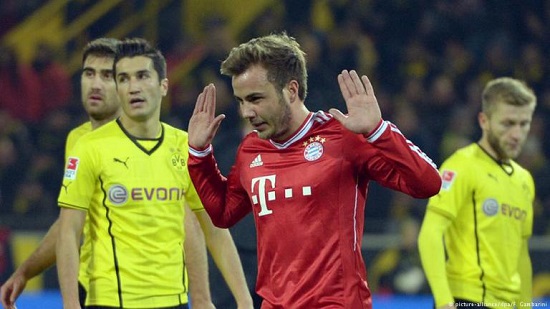With more money than ever flowing in to the German Bundesliga, the league’s biggest clubs are growing more and more careless in how they acquire new talent. DW’s Stefan Bienkowski looks at diminishing returns.
The English Premier League has for quite some time now offered far more money than sense when it comes to signing Bundesliga talents. Although no club in the German top flight is ever eager to sell its best players, fans and club officials have always taken solace in the fact that the likes of Arsenal, Manchester City, Manchester United and others will almost always pay above the market value.
As the old saying goes “with great power, comes great responsibility,” but when it comes to European soccer it’s more along the lines of “with great budgets, comes very little efficiency.” Yet what was once a problem restricted to the English top flight and a handful of “superclubs” around the continent now seems to be slowly seeping in to the way Germany’s top teams do their business.
With more money than ever from selling their own stars, Bundesliga clubs are growing less and less interested in making sure they get the right price for a transfer target. And in many ways they are beginning to resemble their English counterparts.
The most obvious example of such careless spending this summer will surely become evident in the coming days and weeks at Borussia Dortmund. Having sold Ilkay Gündogan and Henrikh Mkhitaryan to Premier League giants Manchester City and Manchester United respectively for a combined fee of 69 million euros ($75 million), the club now seems intent on making sure they spend their recently-acquired fortune whichever way they can.
Despite making a number of smart signings before the recent cash injection in the form of young stars like Ousmane Dembele, Raphael Guerreiro and Emre Mor, as well as efficient moves for solid senior players like Marc Bartra and Sebastian Rode, BVB is now being linked with relatively average players at rather ludicrous prices.
There’s no doubt that Andre Schürrle could add something to Thomas Tuchel’s squad, but the prices quoted by the German media – in the 30-million-euro ballpark – don’t seem to tally with his nine Bundesliga goals and five assists last season.
Similarly, the thought of Mario Götze returning to Dortmund for a fee that would recoup the money Bayern Munich spent on him three years ago makes little to no sense, considering the 24-year old has made next to no progress since moving to Bavaria.
Dortmund CEO Hans-Joachim Watzke would undoubtedly defend the moves and the money spent as necessary to preserving standards at Dortmund but in truth both deals would offer very little by way of value. Each transfer would be as bad as the other and rather similar to the steamrolling tactics that English sides used to rob Dortmund of their key players this summer.
Of course, Dortmund aren’t alone in this careless use of new-found money.
Having sold Granit Xhaka to Arsenal for a record fee of 45.85 million euros, Gladbach sporting director Max Eberl was very quick to spot and acquire a replacement: Christoph Kramer from Bayer Leverkusen.
Although re-signing the former Foal and German World Cup winner makes perfect sense on paper, the 15.3 million euros Gladbach forked out for a player who had since stumbled down the pecking order at Leverkusen seemed quite high. A few days later the club spent a similar sum on Werder Bremen defender Jannik Vestergaard.
Again, both players will undoubtedly offer something to their new team but the amount of money being used has reached new heights. Gladbach – a club that has largely had to rebrand itself as a team that signed inexpensive, young players and sold them for big profits – have slowly began to morph in to a new creature entirely with funds from England so readily available.
Even Leverkusen, a club that did remarkably well to sign Charles Aranguiz, Javier Hernandez and Kevin Kampl for the price of one Mkhitaryan last summer, have found themselves paying over the market price for their targets.
Kevin Volland, once considered a future German international in the making and a forward with immense potential, wasn’t allowed to leave Hoffenheim until Rudi Völler & Co. handed over 21 million euros for a player yet to live up to his billing. Good thing they sold Son Heung-min to Tottenham Hotpsur for a similar price a year before.
Bayern have had the money to make such purchases for several seasons now, but even the Bavarians are seeing their fees increasing, often for younger players who might not step straight in as Bundesliga stars. More than 38-million-euro Germany defender Mats Hummels, 18-year-old Portugal talent Renato Sanches stands out in this regard.
For all his evident talent and potential, paying 35 million euros for an 18-year-old midfielder that has played just six Champions League games in his entire career is a costly gamble for any club. Even one as rich as the reigning German champions.
Unwise transfer fees are clearly nothing new for Germany’s top flight. Fans need only remind themselves of names such as Julian Draxler and Franco Di Santo from last season, as well as Luuk de Jong, Andrea Barzagli and many others from years gone by to note far too much money being spent before.
Yet the silly sums spent this summer seem to be reaching a whole new level. The Bundesliga has until now being more than happy to accept over-the-top transfer fees from England, but it now seems to be affecting how clubs runs their own business.



